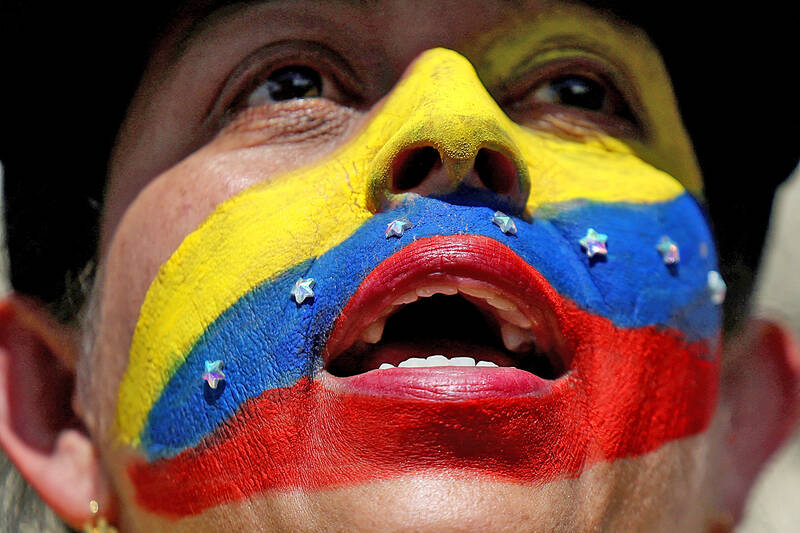The inauguration of Venezuelan President Nicolas Maduro left his opponents to grapple with conflicting feelings of hope and disappointment yesterday, pondering why the self-described socialist leader could not be stopped despite credible evidence that he had lost the election last year.
Some described their mood after Friday’s ceremony at the legislative palace in Caracas like an emotional hangover, while others said they feel abandoned.
Many expressed cautious optimism, finding a measure of comfort in the social media videos released by two opposition leaders — former lawmaker Maria Corina Machado and Edmundo Gonzalez, the opposition’s candidate in the vote — who had promised to topple Maduro.

Photo: Reuters
“In the end, it feels as if the soup got cold,” college professor Nelson Perez said. “We’ve been on the subject of not losing hope for a while. But then you realize it’s more of the same.”
That realization is hard to process for millions of Venezuelans who, like Perez, had imagined a different Jan. 10 — one with Gonzalez receiving the presidential sash and Machado giving one of her signature fiery speeches before the Venezuelan National Assembly. Instead, Gonzalez and Machado sent messages on social media while Maduro placed his hand on Venezuela’s constitution and took the oath of office, defying overwhelming evidence contradicting his victory claim in the July presidential election.
Venezuela’s National Electoral Council, stacked with government loyalists, had declared Maduro the winner of the July 28 election last year. However, unlike in previous contests, electoral authorities did not provide detailed vote counts to back the announced result.

Photo: Reuters
The opposition collected tally sheets from 85 percent of electronic voting machines and posted them online — showing its candidate, Gonzalez, had won by a more than a two-to-one margin. UN experts and the US-based Carter Center, both invited by Maduro’s government to observe the election, said the tally sheets published by the opposition are legitimate.
Machado, in a message on social media on Friday, said Maduro was guilty of a coup by not leaving office by Jan. 10, when by law, Venezuela’s presidential term begins.
She also said she was confident that the country’s “freedom is near,” but stopped short of saying anything about future steps the opposition could take to end Maduro’s presidency.
“You see people, and they look like they have a hangover,” bricklayer Luis Carlos Moreno, 55, said of the mood among those who had stayed away from the inauguration ceremony. “We have to wait until next week to see how things go and if … everyone goes to work and the kids go to school.”
Meanwhile, Gonzalez in a video message told supporters that Maduro’s government would end “soon, very soon” and promised to return to Venezuela.
Those struggling with the idea of Maduro’s rule for six more years included poll workers — many of them were harassed or arrested following the election.
“I’m very disappointed,” said Caracas resident and poll worker Marlyn Ruiz. “Reality is not as we were led to believe.”

POLITICAL PRISONERS VS DEPORTEES: Venezuela’s prosecutor’s office slammed the call by El Salvador’s leader, accusing him of crimes against humanity Salvadoran President Nayib Bukele on Sunday proposed carrying out a prisoner swap with Venezuela, suggesting he would exchange Venezuelan deportees from the US his government has kept imprisoned for what he called “political prisoners” in Venezuela. In a post on X, directed at Venezuelan President Nicolas Maduro, Bukele listed off a number of family members of high-level opposition figures in Venezuela, journalists and activists detained during the South American government’s electoral crackdown last year. “The only reason they are imprisoned is for having opposed you and your electoral fraud,” he wrote to Maduro. “However, I want to propose a humanitarian agreement that

ECONOMIC WORRIES: The ruling PAP faces voters amid concerns that the city-state faces the possibility of a recession and job losses amid Washington’s tariffs Singapore yesterday finalized contestants for its general election on Saturday next week, with the ruling People’s Action Party (PAP) fielding 32 new candidates in the biggest refresh of the party that has ruled the city-state since independence in 1965. The move follows a pledge by Singaporean Prime Minister Lawrence Wong (黃循財), who took office last year and assumed the PAP leadership, to “bring in new blood, new ideas and new energy” to steer the country of 6 million people. His latest shake-up beats that of predecessors Lee Hsien Loong (李顯龍) and Goh Chok Tong (吳作棟), who replaced 24 and 11 politicians respectively

Young women standing idly around a park in Tokyo’s west suggest that a giant statue of Godzilla is not the only attraction for a record number of foreign tourists. Their faces lit by the cold glow of their phones, the women lining Okubo Park are evidence that sex tourism has developed as a dark flipside to the bustling Kabukicho nightlife district. Increasing numbers of foreign men are flocking to the area after seeing videos on social media. One of the women said that the area near Kabukicho, where Godzilla rumbles and belches smoke atop a cinema, has become a “real

‘WATER WARFARE’: A Pakistani official called India’s suspension of a 65-year-old treaty on the sharing of waters from the Indus River ‘a cowardly, illegal move’ Pakistan yesterday canceled visas for Indian nationals, closed its airspace for all Indian-owned or operated airlines, and suspended all trade with India, including to and from any third country. The retaliatory measures follow India’s decision to suspend visas for Pakistani nationals in the aftermath of a deadly attack by shooters in Kashmir that killed 26 people, mostly tourists. The rare attack on civilians shocked and outraged India and prompted calls for action against their country’s archenemy, Pakistan. New Delhi did not publicly produce evidence connecting the attack to its neighbor, but said it had “cross-border” links to Pakistan. Pakistan denied any connection to